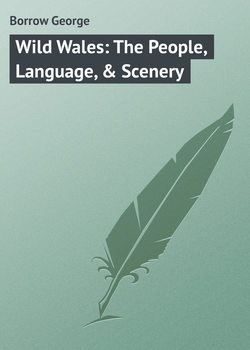Wild Wales: The People, Language, & Scenery

Реклама. ООО «ЛитРес», ИНН: 7719571260.
Оглавление
Borrow George. Wild Wales: The People, Language, & Scenery
INTRODUCTION
I. WHY “WILD WALES” IS A SIMPLE ITINERARY
II. BORROW’S EQUIPMENT FOR WRITING UPON THE WELSH LANGUAGE AND LITERATURE
III. IS NOT “WILD WALES” WRITTEN BY A CELT AND NOT BY AN ANGLO-SAXON?
IV. BORROW’S METHOD OF AUTOBIOGRAPHIC NARRATIVE COMPARED WITH THE METHODS OF DEFOE, WILKIE COLLINS, DICKENS AND THE ABBÉ PRÉVOST
V. WHY ARE THE WELSH GYPSIES IGNORED IN “WILD WALES”?
VI. CELT v SAXON
CHAPTER I
CHAPTER II
CHAPTER III
CHAPTER IV
CHAPTER V
CHAPTER VI
CHAPTER VII
CHAPTER VIII
CHAPTER IX
CHAPTER X
CHAPTER XI
CHAPTER XII
CHAPTER XIII
CHAPTER XIV
CHAPTER XV
CHAPTER XVI
CHAPTER XVII
CHAPTER XVIII
CHAPTER XIX
CHAPTER XX
CHAPTER XXI
CHAPTER XXII
CHAPTER XXIII
CHAPTER XXIV
CHAPTER XXV
CHAPTER XXVI
CHAPTER XXVII
CHAPTER XXVIII
CHAPTER XXIX
CHAPTER XXX
CHAPTER XXXI
CHAPTER XXXII
CHAPTER XXXIII
CHAPTER XXXIV
CHAPTER XXXV
CHAPTER XXXVI
CHAPTER XXXVII
CHAPTER XXXVIII
CHAPTER XXXIX
CHAPTER XL
CHAPTER XLI
CHAPTER XLII
CHAPTER XLIII
CHAPTER XLIV
CHAPTER XLV
CHAPTER XLVI
CHAPTER XLVII
CHAPTER XLVIII
CHAPTER XLIX
CHAPTER L
CHAPTER LI
CHAPTER LII
CHAPTER LIII
CHAPTER LIV
CHAPTER LV
CHAPTER LVI
CHAPTER LVII
CHAPTER LVIII
CHAPTER LIX
CHAPTER LX
CHAPTER LXI
CHAPTER LXII
CHAPTER LXIII
CHAPTER LXIV
CHAPTER LXV
CHAPTER LXVI
CHAPTER LXVII
CHAPTER LXVIII
CHAPTER LXIX
CHAPTER LXX
CHAPTER LXXI
CHAPTER LXXII
CHAPTER LXXIII
CHAPTER LXXIV
CHAPTER LXXV
CHAPTER LXXVI
CHAPTER LXXVII
CHAPTER LXXVIII
CHAPTER LXXIX
CHAPTER LXXX
CHAPTER LXXXI
CHAPTER LXXXII
CHAPTER LXXXIII
CHAPTER LXXXIV
CHAPTER LXXXV
CHAPTER LXXXVI
CHAPTER LXXXVII
CHAPTER LXXXVIII
CHAPTER LXXXIX
CHAPTER XC
CHAPTER XCI
CHAPTER XCII
CHAPTER XCIII
CHAPTER XCIV
CHAPTER XCV
CHAPTER XCVI
CHAPTER XCVII
CHAPTER XCVIII
CHAPTER XCIX
CHAPTER C
CHAPTER CI
CHAPTER CII
CHAPTER CIII
CHAPTER CIV
CHAPTER CV
CHAPTER CVI
CHAPTER CVII
CHAPTER CVIII
CHAPTER CIX
Отрывок из книги
I have been invited by the editor of this series to say a few words upon Borrow’s “Wild Wales.” The invitation has come to me, he says, partly because during the latter days of Borrow’s life I had the privilege as a very young man of enjoying his friendship, and partly because in my story, “Aylwin,” and in my poem, “The Coming of Love,” I have shown myself to be a true lover of Wales – a true lover, indeed, of most things Cymric.
Let me begin by saying that although the book is an entirely worthy compeer of “Lavengro” and “The Romany Rye,” and although like them it is written in the autobiographic form, it belongs, as I propose to show further on, to an entirely different form of narrative from those two famous books. And it differs in this respect even from “The Bible in Spain.” Unlike that splendid book, it is just a simple, uncoloured record of a walking tour through the Principality. As in any other itinerary, events in “Wild Wales” are depicted as they actually occurred, enriched by none of that glamour in which Borrow loved to disport himself. I remember once asking him why in this book he wrote an autobiographic narrative so fundamentally different from “Lavengro” and “The Romany Rye” – why he had made in this book none of those excursions into the realms of fancy which form so charming a part of his famous quasi-autobiographic narratives. It was entirely characteristic of him that he remained silent as he walked rather sulkily by my side. To find an answer to the queries, however, is not very difficult. Making a tour as he did on this occasion in the company of eye-witnesses – eye-witnesses of an extremely different temper from his own, eye-witnesses, moreover, whom he specially wished to satisfy and please – his wife and stepdaughter – he found it impossible to indulge in his bohemian proclivities and equally impossible to give his readers any of those romantic coincidences, those quaint arrangements of incidents to illustrate theories of life, which illuminate his other works. The tour was made in the summer and autumn of 1854; during the two or three years following, he seems to have been working upon this record of it. The book was announced for publication in 1857, but it was not until 1862 that his publisher, who had been so greatly disappointed by the reception given to “Lavengro” and “The Romany Rye,” took courage to offer it to the public.
.....
“No, sir; but you are coming to live here.”
“How do you know that?” said I.
.....